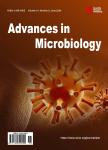Over-Production of P60 Family Proteins, Glycolytic and Stress Response Proteins Characterizes the Autolytic Profile of <i>Listeria monocytogenes</i>
Over-Production of P60 Family Proteins, Glycolytic and Stress Response Proteins Characterizes the Autolytic Profile of <i>Listeria monocytogenes</i>作者机构:BioFig Universidade do Algarve Faculdade de Ciências e Tecnologia Faro Portugal Centro de Biomedicina Molecular e Estrutural (IBB) Faculdade de Ciências e Tecnologia Universidade do Algarve Faro Portugal Department of Infection Immunity and Inflammation University of Leicester Leicester UK
出 版 物:《Advances in Microbiology》 (微生物学(英文))
年 卷 期:2012年第2卷第2期
页 面:181-200页
学科分类:1002[医学-临床医学] 100214[医学-肿瘤学] 10[医学]
主 题:Listeria monocytogenes Autolysis Proteome Stress Proteins
摘 要:Listeria monocytogenes is a foodborne pathogen capable of surviving under challenging conditions both outside and inside the host. During the transition from exponential to stationary phase it experiences a series of environmental changes that require an appropriate response to maintain cell viability. In this study the autolytic behaviour of a L. monocytogenes strain was investigated by two-dimensional electrophoresis. The study was done at the permissive autolysis temperature, 30℃ and at 20℃, an autolysis non-permissive temperature. An autolytic strain proteome was also compared to a non-autolytic strain at the permissive autolysis temperature. The autolytic strain proteome at 30℃ in comparison to 20℃ evidenced increased synthesis of the P60 autolysin, glycolytic enzymes and proteins related with environmental stress responses. The over-production of P45 autolysin, was observed when the autolytic strain proteome was compared with the non-autolytic strain. The proteomes at the non-permissive temperature and the proteome of the non-autolytic strain were characterized by a diminished synthesis of several stress related proteins. The lack of autolysis seems to be associated to the over-production of proteins linked to fatty acid and amino acid synthesis, transcription regulation and cell morphogenesis as evidenced by the proteome at the non-permissive temperature and the non-autolytic strain. Autolysis proteome evidenced the over-production of P60 autolysins, glycolysis and stress proteins whereas the proteome obtained in conditions of absence of autolysis reveal a completely different group of proteins. Possible targets to activate listerial autolysis were identified.



